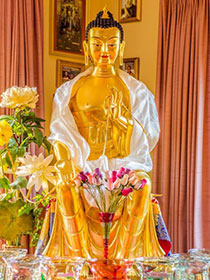- Home
- FPMT Homepage
Foundation for the Preservation of the Mahayana Tradition
The FPMT is an organization devoted to preserving and spreading Mahayana Buddhism worldwide by creating opportunities to listen, reflect, meditate, practice and actualize the unmistaken teachings of the Buddha and based on that experience spreading the Dharma to sentient beings. We provide integrated education through which people’s minds and hearts can be transformed into their highest potential for the benefit of others, inspired by an attitude of universal responsibility and service. We are committed to creating harmonious environments and helping all beings develop their full potential of infinite wisdom and compassion. Our organization is based on the Buddhist tradition of Lama Tsongkhapa of Tibet as taught to us by our founders Lama Thubten Yeshe and Lama Thubten Zopa Rinpoche.
- Willkommen
Die Stiftung zur Erhaltung der Mahayana Tradition (FPMT) ist eine Organisation, die sich weltweit für die Erhaltung und Verbreitung des Mahayana-Buddhismus einsetzt, indem sie Möglichkeiten schafft, den makellosen Lehren des Buddha zuzuhören, über sie zur reflektieren und zu meditieren und auf der Grundlage dieser Erfahrung das Dharma unter den Lebewesen zu verbreiten.
Wir bieten integrierte Schulungswege an, durch denen der Geist und das Herz der Menschen in ihr höchstes Potential verwandelt werden zum Wohl der anderen – inspiriert durch eine Haltung der universellen Verantwortung und dem Wunsch zu dienen. Wir haben uns verpflichtet, harmonische Umgebungen zu schaffen und allen Wesen zu helfen, ihr volles Potenzial unendlicher Weisheit und grenzenlosen Mitgefühls zu verwirklichen.
Unsere Organisation basiert auf der buddhistischen Tradition von Lama Tsongkhapa von Tibet, so wie sie uns von unseren Gründern Lama Thubten Yeshe und Lama Thubten Zopa Rinpoche gelehrt wird.
- Bienvenidos
La Fundación para la preservación de la tradición Mahayana (FPMT) es una organización que se dedica a preservar y difundir el budismo Mahayana en todo el mundo, creando oportunidades para escuchar, reflexionar, meditar, practicar y actualizar las enseñanzas inconfundibles de Buda y en base a esa experiencia difundir el Dharma a los seres.
Proporcionamos una educación integrada a través de la cual las mentes y los corazones de las personas se pueden transformar en su mayor potencial para el beneficio de los demás, inspirados por una actitud de responsabilidad y servicio universales. Estamos comprometidos a crear ambientes armoniosos y ayudar a todos los seres a desarrollar todo su potencial de infinita sabiduría y compasión.
Nuestra organización se basa en la tradición budista de Lama Tsongkhapa del Tíbet como nos lo enseñaron nuestros fundadores Lama Thubten Yeshe y Lama Zopa Rinpoche.
A continuación puede ver una lista de los centros y sus páginas web en su lengua preferida.
- Bienvenue
L’organisation de la FPMT a pour vocation la préservation et la diffusion du bouddhisme du mahayana dans le monde entier. Elle offre l’opportunité d’écouter, de réfléchir, de méditer, de pratiquer et de réaliser les enseignements excellents du Bouddha, pour ensuite transmettre le Dharma à tous les êtres. Nous proposons une formation intégrée grâce à laquelle le cœur et l’esprit de chacun peuvent accomplir leur potentiel le plus élevé pour le bien d’autrui, inspirés par le sens du service et une responsabilité universelle. Nous nous engageons à créer un environnement harmonieux et à aider tous les êtres à épanouir leur potentiel illimité de compassion et de sagesse. Notre organisation s’appuie sur la tradition guéloukpa de Lama Tsongkhapa du Tibet, telle qu’elle a été enseignée par nos fondateurs Lama Thoubtèn Yéshé et Lama Zopa Rinpoché.
Visitez le site de notre Editions Mahayana pour les traductions, conseils et nouvelles du Bureau international en français.
Voici une liste de centres et de leurs sites dans votre langue préférée
- Benvenuto
L’FPMT è un organizzazione il cui scopo è preservare e diffondere il Buddhismo Mahayana nel mondo, creando occasioni di ascolto, riflessione, meditazione e pratica dei perfetti insegnamenti del Buddha, al fine di attualizzare e diffondere il Dharma fra tutti gli esseri senzienti.
Offriamo un’educazione integrata, che può trasformare la mente e i cuori delle persone nel loro massimo potenziale, per il beneficio di tutti gli esseri, ispirati da un’attitudine di responsabilità universale e di servizio.
Il nostro obiettivo è quello di creare contesti armoniosi e aiutare tutti gli esseri a sviluppare in modo completo le proprie potenzialità di infinita saggezza e compassione.
La nostra organizzazione si basa sulla tradizione buddhista di Lama Tsongkhapa del Tibet, così come ci è stata insegnata dai nostri fondatori Lama Thubten Yeshe e Lama Zopa Rinpoche.
Di seguito potete trovare un elenco dei centri e dei loro siti nella lingua da voi prescelta.
- 欢迎 / 歡迎
简体中文
“护持大乘法脉基金会”( 英文简称:FPMT。全名:Foundation for the Preservation of the Mahayana Tradition) 是一个致力于护持和弘扬大乘佛法的国际佛教组织。我们提供听闻,思维,禅修,修行和实证佛陀无误教法的机会,以便让一切众生都能够享受佛法的指引和滋润。
我们全力创造和谐融洽的环境, 为人们提供解行并重的完整佛法教育,以便启发内在的环宇悲心及责任心,并开发内心所蕴藏的巨大潜能 — 无限的智慧与悲心 — 以便利益和服务一切有情。
FPMT的创办人是图腾耶喜喇嘛和喇嘛梭巴仁波切。我们所修习的是由两位上师所教导的,西藏喀巴大师的佛法传承。
繁體中文
護持大乘法脈基金會”( 英文簡稱:FPMT。全名:Found
ation for the Preservation of the Mahayana Tradition ) 是一個致力於護持和弘揚大乘佛法的國際佛教組織。我們提供聽聞, 思維,禪修,修行和實證佛陀無誤教法的機會,以便讓一切眾生都能 夠享受佛法的指引和滋潤。 我們全力創造和諧融洽的環境,
為人們提供解行並重的完整佛法教育,以便啟發內在的環宇悲心及責 任心,並開發內心所蘊藏的巨大潛能 — 無限的智慧與悲心 – – 以便利益和服務一切有情。 FPMT的創辦人是圖騰耶喜喇嘛和喇嘛梭巴仁波切。
我們所修習的是由兩位上師所教導的,西藏喀巴大師的佛法傳承。 察看道场信息:
- FPMT Homepage
- News/Media
-
- Study & Practice
-
-
- About FPMT Education Services
- Latest News
- Programs
- New to Buddhism?
- Buddhist Mind Science: Activating Your Potential
- Heart Advice for Death and Dying
- Discovering Buddhism
- Living in the Path
- Exploring Buddhism
- FPMT Basic Program
- FPMT Masters Program
- FPMT In-Depth Meditation Training
- Maitripa College
- Lotsawa Rinchen Zangpo Translator Program
- Universal Education for Compassion & Wisdom
- Online Learning Center
-
- Prayers & Practice Materials
- Overview of Prayers & Practices
- Full Catalogue of Prayers & Practice Materials
- Explore Popular Topics
- Benefiting Animals
- Chenrezig Resources
- Death & Dying Resources
- Lama Chopa (Guru Puja)
- Lama Zopa Rinpoche: Compendium of Precious Instructions
- Lama Zopa Rinpoche: Life Practice Advice
- Lama Zopa Rinpoche Practice Series
- Lamrim Resources
- Mantras
- Prayer Book Updates
- Purification Practices
- Sutras
- Thought Transformation (Lojong)
- Audio Materials
- Dharma Dates - Tibetan Calendar
- Translation Services
- Publishing Services
- Ways to Offer Support
- Prayers & Practice Materials
-
- Teachings and Advice
- Find Teachings and Advice
- Lama Zopa Rinpoche Advice Page
- Lama Zopa Rinpoche: Compendium of Precious Instructions
- Lama Zopa Rinpoche Video Teachings
- ༧སྐྱབས་རྗེ་བཟོད་པ་རིན་པོ་ཆེ་མཆོག་ནས་སྩལ་བའི་བཀའ་སློབ་བརྙན་འཕྲིན།
- Podcasts
- Lama Yeshe Wisdom Archive
- Buddhism FAQ
- Dharma for Young People
- Resources on Holy Objects
- Teachings and Advice
-
-
*If a menu item has a submenu clicking once will expand the menu clicking twice will open the page.
-
-
- Centers
-
- Teachers
-
- Projects
-
-
-
-
*If a menu item has a submenu clicking once will expand the menu clicking twice will open the page.
-
-
- FPMT
-
-
-
-
-
Tibetan Buddhism teaches you to overcome your dissatisfied mind, but to do that you have to make an effort. To put our techniques into your own experience, you have to go slowly, gradually. You can’t just jump right in the deep end. It takes time and we expect you to have trouble at first. But if you take it easy it gets less and less difficult as time goes by.
Lama Zopa Rinpoche
-
-
-
- Shop
-
-
-
The Foundation Store is FPMT’s online shop and features a vast selection of Buddhist study and practice materials written or recommended by our lineage gurus. These items include homestudy programs, prayers and practices in PDF or eBook format, materials for children, and other resources to support practitioners.
Items displayed in the shop are made available for Dharma practice and educational purposes, and never for the purpose of profiting from their sale. Please read FPMT Foundation Store Policy Regarding Dharma Items for more information.
-
-
Mandala
FPMT News Around the World
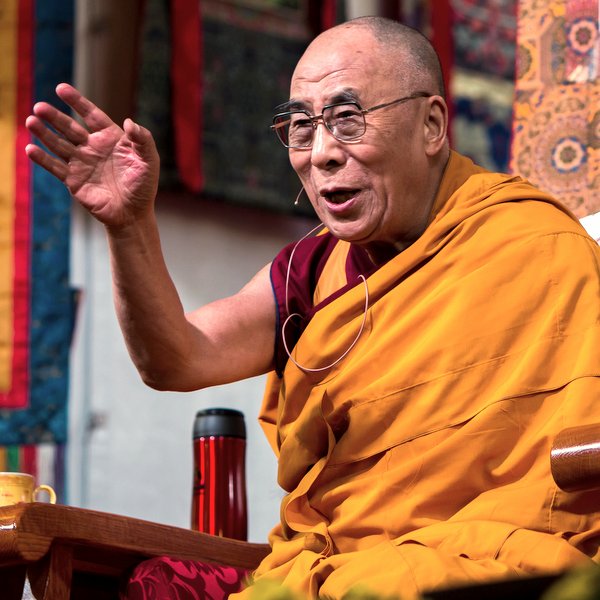
His Holiness the Dalai Lama speaking at Kurukulla Center, Massachusetts, U.S., October 2012. Photo by Kadri Kurgun.
In May 2013, His Holiness the Dalai Lama will participate in an Environmental Summit hosted by Maitripa College in Portland, Oregon, U.S. His Holiness will be joined in panel discussions by religious leaders and politicians to talk about spirituality and the environment and universal responsibility.
His Holiness the Dalai Lama has been advocating publicly for the environment for several decades. In 2006, Mandala reported on the impending climate crisis, a topic that both His Holiness and Lama Zopa Rinpoche have addressed. In 1988, in a speech entitled “Humanity and Ecology,” His Holiness said:
“Peace and the survival of life on earth as we know it are threatened by human activities that lack a commitment to humanitarian values. Destruction of nature and natural resources results from ignorance, greed, and lack of respect for the earth’s living things. … Just as we should cultivate gentle and peaceful relations with our fellow human beings, we should also extend that same kind of attitude toward the natural environment. Morally speaking, we should be concerned for our whole environment. … This, however, is not just a question of morality or ethics, but a question of our own survival. … We must now help people to understand the need for environmental protection. We must teach people to understand the need for environmental protection. We must teach people that conservation directly aids our survival.”
In the article “What Does Al Gore Know that Everyone Should Know?” Mandala shared Lama Zopa Rinpoche’s perspective on the environment. When Rinpoche saw the movie An Inconvenient Truth, Rinpoche commented that former U.S. Vice President Al Gore, who helped create the movie, knows something everyone should know: We are in an environmental decline of global proportions … Action must be taken. Rinpoche said:
People in business who think only of personal profit without consideration for others and the environment are causing great danger to all of us – the country we live in and this whole world.
Al Gore is making us aware of so many things that harm us and our environment. Your happiness depends on others, and others’ happiness depends on you. We all have to live in this world, so we need to be harmonious and happy in a healthy way. No matter who you are or where you are, we all have a responsibility to protect this world.
Maitripa College is the first Buddhist college in the Pacific Northwest and is affiliated with FPMT. Yangsi Rinpoche, Maitripa’s founder and president, extended the invitation to His Holiness to come to Portland and has been closely involved with the development of the summit. Mandala will offer ongoing coverage of the summit and His Holiness’ visit to Portland.
Read more about Buddhism’s environmental roots in “What Does Al Gore Know that Everyone Should Know?” from Mandala October-December 2006.
With more than 160 centers, projects and services around the globe, there is always news on FPMT activities, teachers and events. Mandala hopes to share as many of these timely stories as possible. If you have news you would like to share, please let us know.
It’s not too late to become a Friend of FPMT at the Basic level or higher and receive the April-June 2013 issue, featuring the complete “Skies of Benefit” article!
- Tagged: al gore, environment, his holiness the dalai lama, lama zopa rinpoche, maitripa college, mandala
- 0
27
Lama Zopa Rinpoche on Fear of Flying
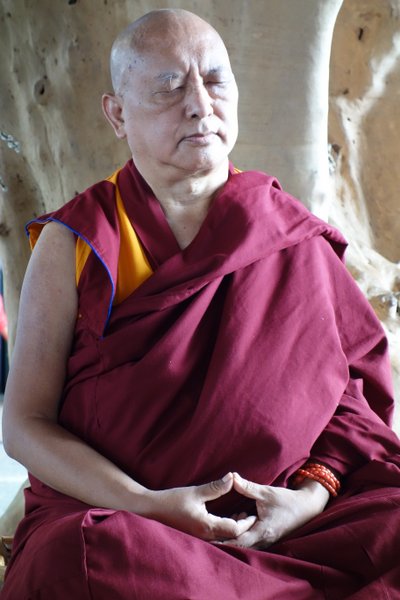
Lama Zopa Rinpoche meditating, Singapore Gardens, March 2013. Photo by Ven. Roger Kunsang.
Lama Zopa Rinpoche’s Online Advice Book is a collection of a wide range of advices given by Rinpoche to specific students in responses to letters and requests. The Lama Yeshe Wisdom Archive compiles and edits these pieces, adding new ones each month. Mandala offers these excerpts hoping to benefit students and to raise awareness of the Online Advice Book.
From the page on “Fears” – A student told Lama Zopa Rinpoche that he was afraid of flying. In response, Rinpoche offered this advice:
Just before departure and during the flight, it is very good to recite the names of the ten directions’ Buddhas. If you keep on reciting the names, in whichever direction you are flying, if you recite that Buddha’s name and pay one-pointed attention to this, not only will you be free from danger, but your wishes will be fulfilled. So not only is this for safe travel, but for the successful fulfillment of whatever goals you had for going in that direction.
It is very good to pray not just for your own safety, but on behalf of all the people in the airplane – all 300 passengers and crew, or however many people there are – for them all to have a safe journey. Not only that, but you can pray that whoever this airplane carries may always be safe. It’s very good to pray like that.
To learn more about Lama Zopa Rinpoche’s Online Advice Book and find more advice, visit the Lama Yeshe Wisdom Archive.
- Tagged: fear, flying, lama zopa rinpoche online advice book, mandala
- 0
22
The Path to Changing One’s Mind
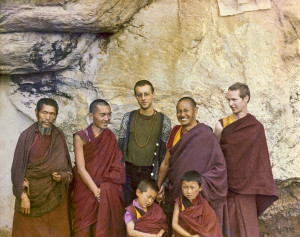
At the Lawudo Lama’s cave, Nepal, 1972. From the left to right: unknown monk, Lama Zopa, Massimo Corona, Lama Yeshe, Jhampa Zangpo, with two new Mount Everest Centre novice monks. Photo courtesy of Lama Yeshe Wisdom Archive.
Long-time FPMT student Massimo Corona shares his journey on the road to Kopan:
“1968 was a special year: students were in revolt, the psychedelic universe was coming into being, and I was looking for the real meaning of life. I was born into a rich family, had gone to school in Switzerland, and a position in my father’s company was assured. But something was missing. The thought of being a rich entrepreneur like my father was not attractive at all. That year, I was attending – or pretending to attend – the second year of the Bocconi Business School in Milan, Italy, but I was also smoking a lot of pot and doing some LSD. Slowly, something changed in my vision of life and I started looking for some answers. After reading a few books on Eastern religions, I decided that I had to find a master who could give me those answers. I had a couple of friends who had already left for India and Nepal and from their letters it seemed that they found their answers. So, I decided to drop out and go to India …”
- Tagged: mandala, your community
- 0
18
Ven. George Churinoff on the ‘The Purpose of Study’
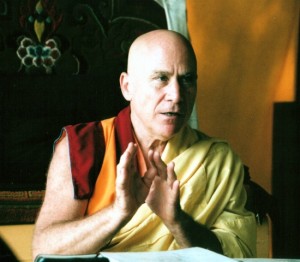
Ven. George Churinoff teahcing. Photo courtesy of Ven. George Churinoff.
Mandala spoke with Ven. George Churinoff in early February 2013 between his classes as a visiting instructor at Maitripa College in Portland, Oregon, U.S.
Mandala: What is the benefit of in-depth Buddhist study?
Ven. George Churinoff: All of our lamas, almost without exception, have great educations. So if you look from the outside, there must be something there, some importance.
There are three kinds of wisdom that you have to build up sequentially. The first is the wisdom of hearing – hearing the teachings, reading and studying. Next is the wisdom that arises after having heard and understood the words and contemplating their meaning, fine tuning your understanding through debate, questions and answers, and thinking deeply about these things again and again. Finally, there’s the wisdom that comes when you’ve got a clear understanding and you meditate on that and you place the mind on that single-pointedly. When we talk about the three kinds of wisdom, we would like to have the wisdom that arises from meditation. There’s this famous adage that you’ve probably heard that to try to meditate without having heard or studied is like someone trying to climb up a craggy cliff with no arms.
Sometimes when people get excited about Buddhism and meditation, they think, “I’m just going to meditate. All that study is for scholars.” But in order to meditate, you have to have something to meditate about. And hopefully what we’re going to meditate on is a correct understanding, not a blurry, or, even worse, a wrong understanding …
From Mandala July-September 2013
- Tagged: mandala, teachings and advice
- 0
15
Tantra Comes from Buddha
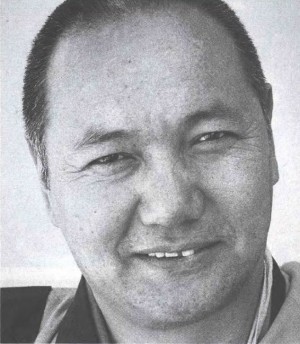
Lama Yeshe
“The first thing I want to say is that Buddhist tantra definitely comes from Shakyamuni Buddha,” declared FPMT founder Lama Yeshe. “Before his enlightenment, when he was a tenth-level bodhisattva, the buddhas of the ten directions stirred him from his deep meditative absorption and said, ‘You’ve attained the highest bodhisattva level, which is completely free from ego conflict, emotional problems, and anxiety, but to discover the omniscient wisdom and eternal bliss of buddhahood, you have to receive tantric initiation.’ So they initiated him and he was then able to attain enlightenment.” …
From Mandala February-March 2008
- Tagged: mandala, teachings and advice
- 0
14
Advice on Circumambulation from Lama Zopa Rinpoche
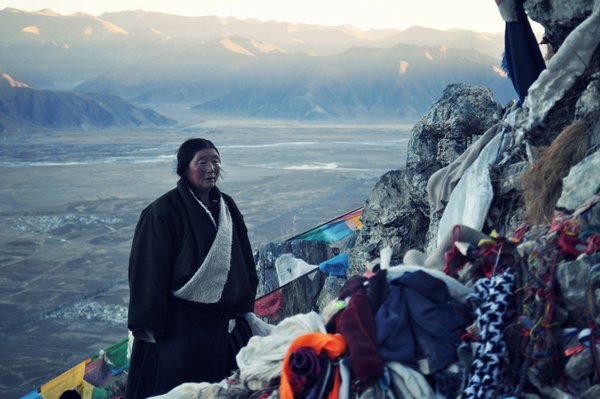
Korwa route at Ganden Monastery, Tibet. Photo by Matt Lindén.
The new April-June issue of Mandala focused on pilgrimage and includes valuable advice from Lama Zopa Rinpoche on the practice of prostration, something one would do at a holy site. Circumambulation is another essential practice one does on pilgrimage.
In the July-September 2009 issue of Mandala, Ven. Sarah Thresher introduced readers to the practice of circumambulation, a spiritual activity that Lama Zopa Rinpoche advises as an excellent method for accumulating merit and purifying negativities. In this article, Rinpoche gives step-by-step advice on how to best circumambulate and recommends four special mantras to recite before beginning the practice. You can read the complete article as a PDF.
- Tagged: mandala, teachings and advice
- 0
11
Skies of Benefit: The New Issue of Mandala
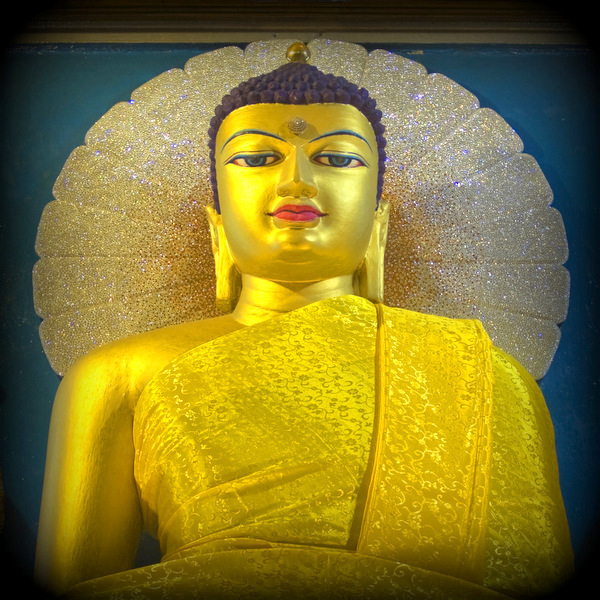
Buddha at Mahabodhi Temple, Bodhgaya, India. Photo by Dreamstime.
Mandala’s April-June 2013 print issue has just been published. In it, we take a look at the “Skies of Benefit” one can create through the correct practice of pilgrimage.
Our exclusive online content for this issue includes advice from Lama Zopa Rinpoche on circumambulation, an interview with pilgrimage organizer Effie Fletcher, and a reflection on pilgrimage by FPMT student Gwen McEwen.
Also in this issue’s online content, Ven. George Churinoff discusses the benefit of in-depth Buddhist study; a video of Tenzin Ösel Hita talking about understanding reality; a new video from Geshe Thubten Soepa; Massimo Corona shares his “Road to Kopan” story; our regular columnist Sarah Shifferd searches for uplifting contemporary music; and Scott Snibbe, a computer entrepreneur and visual artist who’s currently leading an online retreat through Vajrapani Institute, talks about Dharma and technology.
If you’d like to receive our print edition of Mandala magazine through the mail, please consider becoming a Friend of FPMT at the Basic level or higher. For a monthly contribution of $5, you support the work of FPMT International Office and will receive Mandala quarterly. In our latest issue, we feature new stories on pilgrimage in Tibet, China, India and Nepal plus advice from Lama Zopa Rinpoche and our other regular features. If you sign up now, we’ll send you a copy of the new issue.
8
How to Become Enlightened When You Can’t Do Retreat
By Ven. Chönyi Taylor
Without understanding how your inner nature evolves, how can you possibly discover eternal happiness? Where is eternal happiness? It’s not in the sky or in the jungle; you won’t find it in the air or under the ground. Everlasting happiness is within you, within your psyche, your consciousness, your mind. That’s why it is so important that you investigate the nature of your own mind. – Lama Yeshe1
According to the teachings, we need at least six months’ retreat on calm abiding if we want to attain that yogic perception called “direct realization of emptiness.” That is difficult. I’m not referring so much to the realization, which is hard enough, but to the logistics of organizing the retreat. There is a huge quantity of conditions that need to come together. There are countless demands on monks and nuns, and even more on lay students. What to do? Lots.
I am a nun, but I am not that far removed from the demands of lay life that I have forgotten what it is like to be a mother. My resident granddaughter keeps reminding me. I wake to the phone. It is 6:30 a.m. and she is staying with a friend. “Nanni, I want to come home ’cos I’m not sleeping well here.” I go to collect her as the sun begins to move above the horizon. My mind is still in a fog, and so are the valleys. The cows are grazing with seemingly amputated legs. It is going to be a hot day. Grace collapses in her own bed. I have a blog to write. Conditions are hardly conducive to single-pointed concentration.
So how can we ever attain enlightenment? We read the arguments about the non-existence of the false view of self, that is, about emptiness. OK. So what? I have this false projection of who I am, but what does that mean to a simple student like me? Knowing that is not making me happy unless I am the best debater in the class. Lama Yeshe says that Buddhism is a profound psychology. What did he mean and what has psychology to do with enlightenment?
The answer is quite simple. Every time I get agitated about something, it is because I am once again trapped in this wrong view. It does not matter whether I know this or not. It does not matter whether I have been able to follow the logic or not. Every time I become agitated, self-pitying, depressed, angry, jealous or any one of the countless variations of such emotions, then I am behaving as if that false self is me. This is very convenient. It means that every time I fail, or get sick, or I cannot get to teachings, or go on retreat, or be noticed by the teacher, or follow the teachings … each of these “obstacles” are really my personal teachings on emptiness.
How about that? Teachings on emptiness specifically designed for me and my limitations. How lucky can I be? Teachings just for me. What an amazing opportunity. And to benefit from these teachings, all I need to do is watch my mind.
There are so many of these opportunities every day. Take being woken by the phone at 6:30 a.m. on a Sunday morning. What would your mind do? Well, first of all, my mind had to disentangle the dream of my sleep and the dream of my waking. Then I had to stop it from falling into either the “poor me” trap or “how could she?” trap, either of which could set off a string of negative emotions. In other words, I had to watch my mind.
All day there are countless opportunities to observe the effects of the deep habit of believing in a self that does not actually exist. The bush flies, the mossies, the milk running out, the ache in my ear, the humidity, my body disintegrating towards the grave, the dog wanting a walk, my computer acquiring a virus, what to cook for tea. Any of these situations can trigger the non-existent self into action. Every big or little negative emotion we experience comes from believing this false self is real.
How dare “I” be disturbed? My peace and comfort should never be threatened. My needs are more important. This false self tells me it is all about “me” and “mine.” Every day, every moment we come across this insidious belief and its effects on our emotions. These are our own personalized teachings on emptiness.
Of course, in the end we have to retreat to a quiet place and meditate. Meditation, though, is not going to help if we have not had many opportunities to examine our minds. I might meditate on compassion for a month, but that is useful only if I become more compassionate as a result. I only know if I have become more compassionate by reflecting on my interactions with people around me. During one such retreat, the Gulf War started just after I entered and finished just before I came out. I was so overwhelmed by the horror that I ran back to my retreat hut. My compassion was still limited. To be compassionate, I have to watch my own mind, day in and day out. I have to be my own therapist.
That is why Buddhism is a psychology. Right from the start it is relevant to the petty or prominent difficulties in our lives, whether we are ordained or lay students, whether we are academic or emotional, whether we can attend teachings or not.
Ven. Chönyi Taylor is a registered Foundational Buddhism FPMT teacher and an elder for the Discovering Buddhism at Home Course. She is the author of Enough! A Buddhist Approach to Working with Addictive Patterns (Snow Lion, 2010) and has been published in Mandala, Buddhadharma, Dharma Vision and Sangha Magazine. She is a founding member and member of the training committee of the Australian Association of Buddhist Counsellors and Psychotherapists and an Honorary Lecturer in the Discipline of Psychiatry at Sydney University.
5
New Video: Lama Zopa Rinpoche on Karma
- Tagged: fpmt taiwan, lama zopa rinpoche, taiwan, video
- 0
4
‘The Benefits of Wearing Robes,’ a conversation with Lama Zopa Rinpoche

Ven. Lobsang Kalden
Taken from a conversation with Lama Zopa Rinpoche on the benefits of wearing one’s monastic robes in public:
“If you were sangha but you didn’t wear robes, then people would not know [that you were ordained], but with robes on there is no question. That is how the robes have such incredible benefit for the mind. It is planting the seed for enlightenment when people show respect to your wearing of the robes, or to the robes themselves: This is planting the seed of liberation, and is a way of benefiting sentient beings…”
Read the full conversation online …
From Mandala August-September 2007
2
Dreaming in the Food Court
From Ven. Roger Kunsang:
Taiwan–March 2, 2013
We stopped for dinner, at a food court on the drive to Kaoshung. (We were driving from Taipei in the north to Kaoshung in the south of Taiwan. We got off to a late start as Rinpoche was trying to squeeze in as much as possible at Jinsui Farlin, our center in Taipei, before leaving.) It’s around midnight and not easy to find something open.
The food court had many small restaurants even an Irish Potato place … Hmmm delicious! But they were all closed except for a place specializing in pork dishes(!) and a coffee shop (midnight, can you imagine … coffee?). So we settled for the only thing existing for midnight vegetarians … tea/coffee and a sandwich of delicious white bread.
Rinpoche was sitting at the table with tea and delicious sandwich and seemed to be thinking contemplatively as he watched the people moving around in the shopping area (seeming to not have the slightest interest in the delicious sandwich). We all were very hungry, so not wanting to wait too long to eat the delicious sandwich.
Rinpoche then mentioned with a mixture of sadness and compassion, “When you don’t think of the next life … people are wandering, like in a dream, believing 100% the dream is real! Like in a illusion or mirage … believing it’s all real.” (Rinpoche was watching the people walking around very focused on the shops and shaking his head.)
Rinpoche continued, “Imagine walking around like this and no idea of your next life and that life is not according to your choice; it is up to karma we create. Most likely insects, jelly fish … what suffering. So knowing Dharma is a huge benefit! Wow wow wow, so so so fortunate having met Dharma. Knowing Dharma is a huge opening of the eyes; the need for money in this life becomes like nothing. So so so fortunate having met Dharma.”
UPDATE: Ven. Roger share’s a video from the food court.
Ven. Roger Kunsang is CEO of FPMT and assistant to FPMT spiritual director Lama Zopa Rinpoche.
To keep up to date with “Life on the Road with Lama Zopa Rinpoche,” consider signing up for our RSS feed (in the right-hand column of this page).
- Tagged: fpmt taiwan, lama zopa rinpoche, taiwan
- 0
19
Thupten Jinpa on the Term “Meditation”
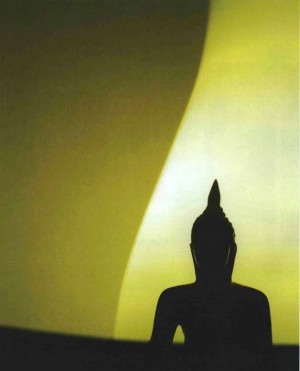
Image: Artist unknown
“Etymologically, the Sanskrit term [for meditation] connotes the notion of ‘cultivation,’ while its Tibetan equivalent gom carries the idea of developing ‘familiarity,’ together implying the idea of some kind of repetitive process of cultivating a familiarity, whether it is with respect to a habit, a way of seeing, or a way of being,” writes Thupten Jinpa, His Holiness the Dalai Lama’s chief English translator. “In its actual usage, however, the term gom is applied not only to the process of ‘cultivation’ or ‘development of familiarity,’ it is also applied to the resultant states achieved through such processes. So, in this sense, meditation can refer both to the practice of disciplined cultivation as well as the cultivated result of such a discipline…”
From Mandala December 2006 – January 2007
- Tagged: mandala, practicing dharma in daily life
- 0
- Home
- News/Media
- Study & Practice
- About FPMT Education Services
- Latest News
- Programs
- New to Buddhism?
- Buddhist Mind Science: Activating Your Potential
- Heart Advice for Death and Dying
- Discovering Buddhism
- Living in the Path
- Exploring Buddhism
- FPMT Basic Program
- FPMT Masters Program
- FPMT In-Depth Meditation Training
- Maitripa College
- Lotsawa Rinchen Zangpo Translator Program
- Universal Education for Compassion & Wisdom
- Online Learning Center
- Prayers & Practice Materials
- Overview of Prayers & Practices
- Full Catalogue of Prayers & Practice Materials
- Explore Popular Topics
- Benefiting Animals
- Chenrezig Resources
- Death & Dying Resources
- Lama Chopa (Guru Puja)
- Lama Zopa Rinpoche: Compendium of Precious Instructions
- Lama Zopa Rinpoche: Life Practice Advice
- Lama Zopa Rinpoche Practice Series
- Lamrim Resources
- Mantras
- Prayer Book Updates
- Purification Practices
- Sutras
- Thought Transformation (Lojong)
- Audio Materials
- Dharma Dates – Tibetan Calendar
- Translation Services
- Publishing Services
- Teachings and Advice
- Find Teachings and Advice
- Lama Zopa Rinpoche Advice Page
- Lama Zopa Rinpoche: Compendium of Precious Instructions
- Lama Zopa Rinpoche Video Teachings
- ༧སྐྱབས་རྗེ་བཟོད་པ་རིན་པོ་ཆེ་མཆོག་ནས་སྩལ་བའི་བཀའ་སློབ་བརྙན་འཕྲིན།
- Podcasts
- Lama Yeshe Wisdom Archive
- Buddhism FAQ
- Dharma for Young People
- Resources on Holy Objects
- Ways to Offer Support
- Centers
- Affiliates Area
- Teachers
- Projects
- Charitable Projects
- Make a Donation
- Applying for Grants
- News about Projects
- Other Projects within FPMT
- Support International Office
- Projects Photo Galleries
- Give Where Most Needed
- FPMT
- Shop
Subscribe to FPMT News
Translate*
*powered by Google TranslateTranslation of pages on fpmt.org is performed by Google Translate, a third party service which FPMT has no control over. The service provides automated computer translations that are only an approximation of the websites' original content. The translations should not be considered exact and only used as a rough guide.Good human qualities… honesty, sincerity, a good heart, cannot be bought with money, nor can they be produced by machines, but only by the mind itself. We call this the inner light, or God’s blessing, or human quality. This is the essence of mankind.







